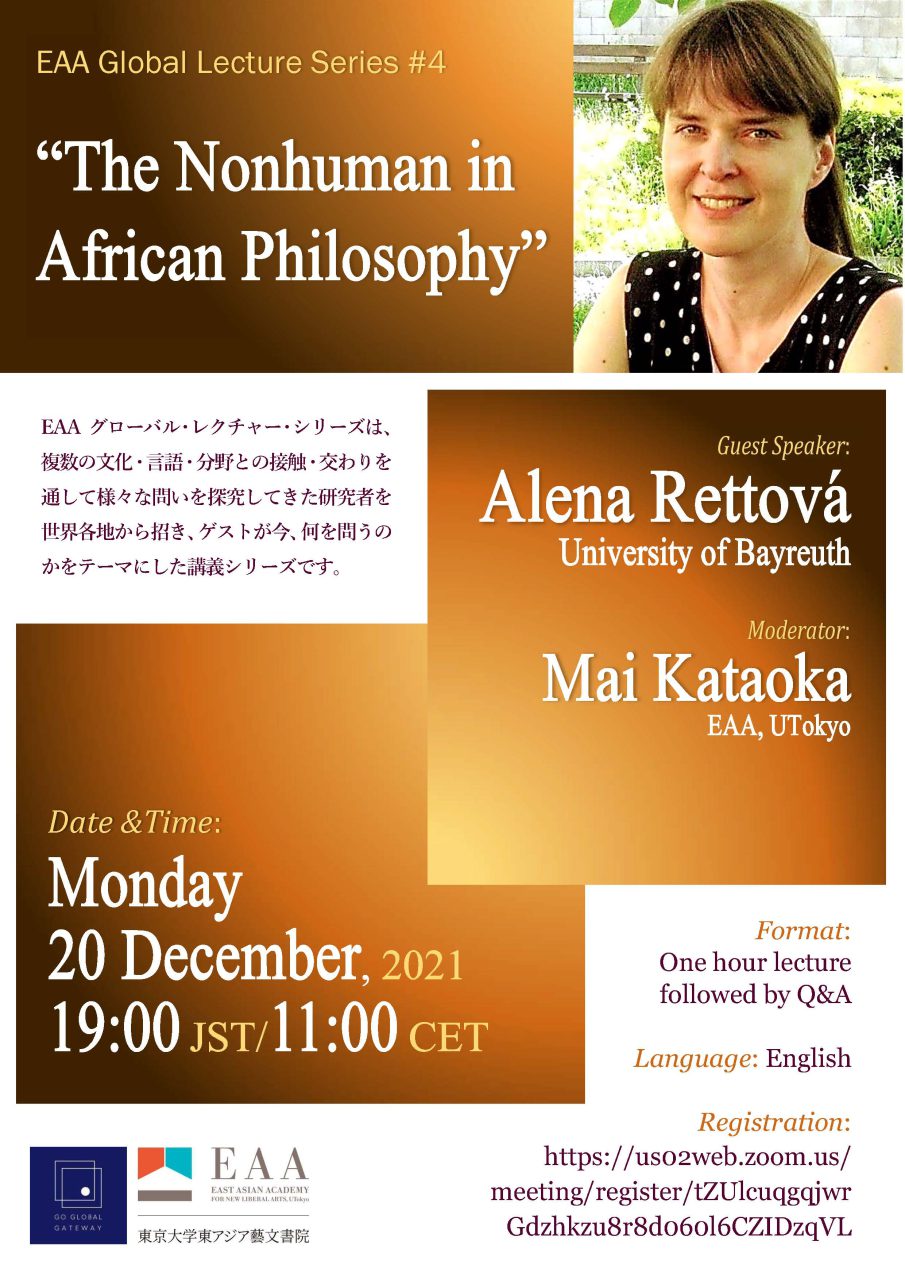EAA Global Lecture Series invites guest speakers from across the world and disciplines to talk about research questions that they have now, so to provide opportunities to get to know various perspectives arising from the researchers’ rich cultural, linguistic, and academic experience.
Guest speaker: Professor Alena Rettová (Professor at University of Bayreuth)
Moderator: Dr. Mai Kataoka (Project Research Fellow, EAA UTokyo)
Date and time: 20 December 2021, 7:00 pm JST (11:00 am CET)
Format: One hour lecture followed by Q&A (on Zoom)
Language: English
Registration: To join this event, please register to attend.
About the lecture
“I know of no African philosopher who has not argued that African philosophy is humanistic,” states Lewis R. Gordon, and goes on to define humanism as “a value system that places priority on the welfare, worth, and dignity of human beings” (2008: 186). Gordon derives “African humanism” from the ontological hierarchy inherent in African cosmologies, which places God on top, followed by spiritual beings, ancestors, and then humans. Animals, plants and inanimate nature follow in rank after humans. On the other hand, many African philosophers situate the root of “African humanism” in social practice. This is the case of “Ubuntu”, literally “humanity” or even “humanism”, seen as a fundamental philosophy common to all Africa (Ramose 1999). “Ubuntu” is a philosophy built on two pillars, a normative understanding of humanity and a constitutive role of community in the formation of humanity.
Against this presentation of African Philosophy, my paper interrogates the conceptualizations of the nonhuman in African thought. Drawing on philosophical insights found in precolonial texts in African languages, the paper demonstrates how these insights translate into contemporary narratives in and about Africa and how pivotal historical events of modern African history have been understood and articulated within the conceptual frameworks projected by such precolonial textual traditions.
About the speaker
Alena Rettová is Professor of African and Afrophone Philosophies at the University of Bayreuth, Germany, where she leads an ERC-funded project on “Philosophy and Genre: Creating a Textual Basis for African Philosophy”. She is the author of African Philosophy: History, Trends, Problems (Czech 2001); Afrophone Philosophies: Reality and Challenge, 2007; Chanter l’existence: La poésie de Sando Marteau et ses horizons philosophiques (French 2013); and We Hold on to the Word of Lizard. A Small Anthology of Zimbabwean Ndebele Writing (ed., Czech and English 2004).
Latest publications:
1. 2021. (forthcoming) Critical Conversations in African Philosophy: Asixoxe – Let’s Talk!, ed. together with Benedetta Lanfranchi and Miriam Pahl. London and New York: Routledge.
2. 2021. “Post-Genocide, Post-Apartheid: The Shifting Landscapes of African Philosophy, 1994-2019.” Modern Africa 9.1: 11-58. https://edu.uhk.cz/africa/index.php/ModAfr/article/view/360/216.
3. 2021. “Generic Fracturing in Okot p’Bitek’s White Teeth.” Journal of Commonwealth Literature. doi.org/10.1177/0021989420984826 (online Feb 5, 2021).
4. 2021. “Epistemology and literature: Positivism, indeterminacy, holism, and relativism in the Swahili Novel.” In Critical Conversations in African Philosophy: Asixoxe – Let’s Talk!, ed. Alena Rettová, Benedetta Lanfranchi, and Miriam Pahl, London: Routledge.
5. 2021. “Philosophy and Genre: African Philosophy in Texts.” In: Albert Kasanda and Marek Hrubec (eds.). Africa in a Multilateral World: Afropolitan Dilemmas. London and New York: Routledge, pp. 203-228.
6. 2020. “‘Moyo wangu, nini huzundukani?’: Self and Attention in Sayyid Abdallah bin Ali bin Nasir’s Al-Inkishafi.” Journal of World Philosophies 5.2: 28–42. Retrieved from https://scholarworks.iu.edu/iupjournals/index.php/jwp/article/view/4044.
Organised by East Asian Academy for New Liberal Arts (EAA) and Go Global Gateway (GGG), the University of Tokyo









